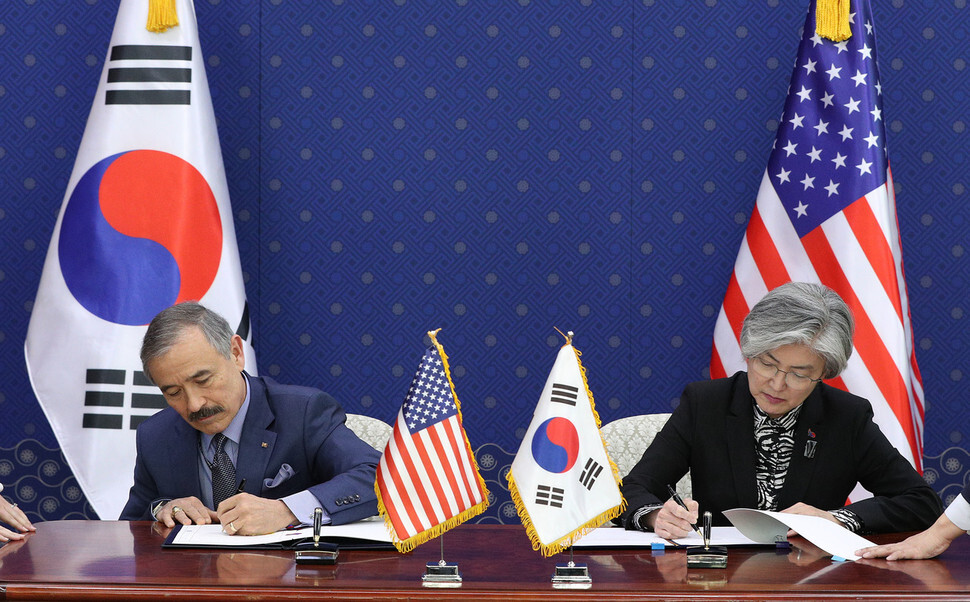hankyoreh
Links to other country sites 다른 나라 사이트 링크
[Editorial] S. Korea-US defense cost-sharing should not undermine bilateral alliance

South Korea and the US’ defense cost-sharing negotiations will be taking place in Honolulu on Oct. 23-24. While this is the second round of the negotiations for the 11th cost-sharing agreement, which will take effect next year, it’s the first to be held since a new official was appointed to lead South Korea’s team of negotiators. This round is when the back-and-forth between the two sides is expected to get serious. Since the Americans have taken every opportunity to make vocal calls for a major increase in South Korea’s financial contribution, they’re expected to pile on the pressure to achieve tangible results. The South Korean negotiators need to counter this by working to find a compromise that can achieve a reasonable level of fair and equitable cost-sharing. The Americans should also take heed of warnings that excessive pressure to pay more could undermine the future of the two countries’ alliance and should join efforts to reach a mutually beneficial understanding.
The US is reportedly asking for South Korea to increase its defense contribution to US$5 billion a year — an immense sum that is five or six times greater than the current amount of 1.04 trillion won (US$886.16 million). A document prepared by the US Defense Department summarizing operations and maintenance costs in the 2019 fiscal year suggests that the direct cost of stationing US troops in South Korea is US$4.4 to 4.5 billion, even after South Korea’s contribution is factored in. As a consequence, the US’ demand for US$5 billion is tantamount to expecting South Korea to pay the entire cost of the troop presence. This brings to mind the ancient practice of hiring mercenary armies. That’s hardly appropriate language for countries in an allied relationship based on shared values.
“The US has submitted new categories of expenses in order to get an excessive increase in the amount [of our financial contribution],” said Democratic Party lawmaker Lee Cheol-hui during an audit at the National Assembly’s Legislation and Judiciary Committee on Oct. 18. The new expense categories reportedly include not only the deployment of strategic assets and joint exercises and drills but also support for civilian employees of the military and the families of American soldiers. These are unreasonable demands that contravene the spirit of a system designed to split the cost of stationing US troops in South Korea.
A few days ago, members of a group of progressive university students scaled the walls of the residence of the US ambassador in Seoul. It’s unacceptable for university students to trespass on a foreign mission, whatever their reasons. That said, their actions demand the attention of the governments of both South Korea and the US since it reflects the public’s rejection of the US’ excessive demands for more money.
The cash contribution is just one of many ways that South Korea helps cover the cost of stationing American troops in South Korea. According to data released in May 2018 by the Korea Institute for Defense Analyses, South Korea was providing more than 4 trillion won (US$3.41 billion) in direct and indirect support in 2015, including various exemptions from taxes and usage fees and rent-free land grants, and that figure doesn’t even include the yearly contribution.
The US bases in South Korea are a key asset in American military strategy in Northeast Asia, which is designed to counter not only North Korea but also China. In that sense, it’s unfair to ask South Korea to pay all the costs. During these negotiations, the South Korean and American teams need to devise fair and reasonable cost-sharing principles that can address the two countries’ shared security interests and find a mutually satisfactory compromise. That’s the way to preserve the values of the alliance.
Please direct comments or questions to [english@hani.co.kr]

Editorial・opinion
![[Editorial] Intensifying US-China rivalry means Seoul must address uncertainty with Beijing sooner than later [Editorial] Intensifying US-China rivalry means Seoul must address uncertainty with Beijing sooner than later](https://flexible.img.hani.co.kr/flexible/normal/500/300/imgdb/original/2024/0517/8117159322045222.jpg) [Editorial] Intensifying US-China rivalry means Seoul must address uncertainty with Beijing sooner than later
[Editorial] Intensifying US-China rivalry means Seoul must address uncertainty with Beijing sooner than later![[Column] When ‘fairness’ means hate and violence [Column] When ‘fairness’ means hate and violence](https://flexible.img.hani.co.kr/flexible/normal/500/300/imgdb/original/2024/0516/7417158465908824.jpg) [Column] When ‘fairness’ means hate and violence
[Column] When ‘fairness’ means hate and violence- [Editorial] Yoon must stop abusing authority to shield himself from investigation
- [Column] US troop withdrawal from Korea could be the Acheson Line all over
- [Column] How to win back readers who’ve turned to YouTube for news
- [Column] Welcome to the president’s pity party
- [Editorial] Korea must respond firmly to Japan’s attempt to usurp Line
- [Editorial] Transfers of prosecutors investigating Korea’s first lady send chilling message
- [Column] Will Seoul’s ties with Moscow really recover on their own?
- [Column] Samsung’s ‘lost decade’ and Lee Jae-yong’s mismatched chopsticks
Most viewed articles
- 1[Editorial] Transfers of prosecutors investigating Korea’s first lady send chilling message
- 2[Exclusive] Unearthed memo suggests Gwangju Uprising missing may have been cremated
- 3[Column] US troop withdrawal from Korea could be the Acheson Line all over
- 4[Editorial] Intensifying US-China rivalry means Seoul must address uncertainty with Beijing sooner t
- 5Xi, Putin ‘oppose acts of military intimidation’ against N. Korea by US in joint statement
- 6[Column] When ‘fairness’ means hate and violence
- 7‘Shot, stabbed, piled on a truck’: Mystery of missing dead at Gwangju Prison
- 8China calls US tariffs ‘madness,’ warns of full-on trade conflict
- 9Seoul government announces comprehensive measures to prevent lonely deaths
- 10Records show how America stood back and watched as Gwangju was martyred for Korean democracy